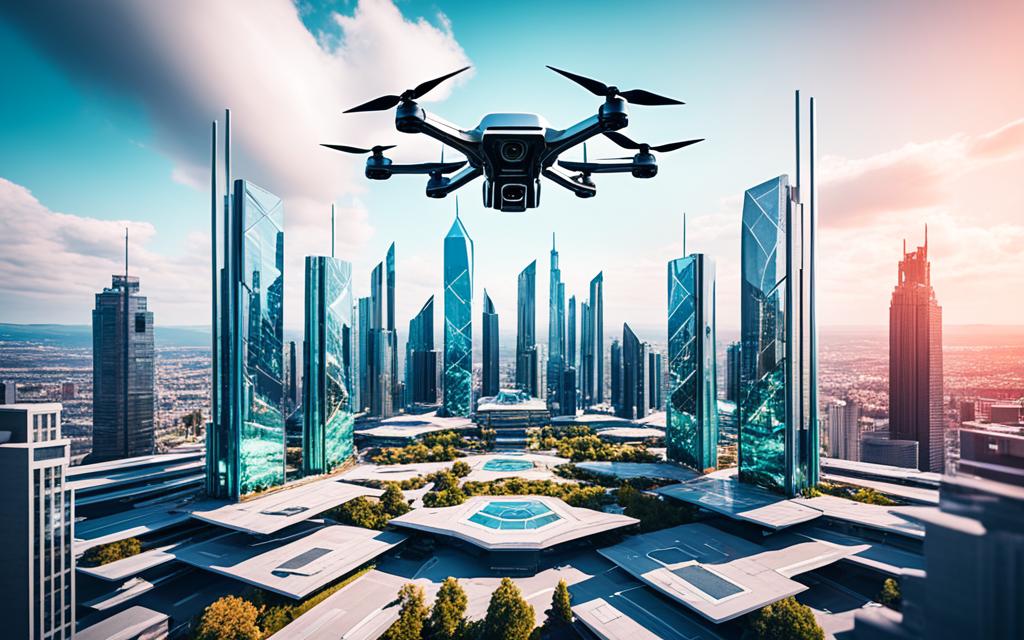Table of Contents
Chancellor Jeremy Hunt is set to unveil a £800 million package in the UK Budget that focuses on advancing AI and drone technologies. This package includes a £360 million investment in research and development (R&D) and manufacturing projects across the life sciences, automotive, and aerospace sectors. The aim is to make the UK a world leader in manufacturing and secure highly skilled jobs for the future.
The funding will also support the development of zero-carbon aircraft technology and automotive technology. Additionally, the Budget includes measures to improve productivity in the public sector through the use of drones and artificial intelligence (AI). These changes are expected to deliver significant benefits to public sector productivity and help free up resources for other areas.
UK Manufacturing and R&D Investment
The UK Budget includes a £360 million package that focuses on UK manufacturing and tech research and development. This investment aims to transform the UK into a world leader in manufacturing and secure highly skilled jobs for the future.
The package includes joint government and industry investment, with £92 million allocated to expanding the manufacture of life-saving medicines and diagnostics products. This funding will support the growth of the pharmaceutical industry and improve healthcare outcomes.
Furthermore, the Budget includes a £200 million investment in zero-carbon aircraft technology, aiming to develop a more sustainable aviation sector. This investment aligns with the UK’s commitment to combat climate change and reduce carbon emissions in the transportation industry.
Moreover, the Budget promises a £73 million investment in automotive technology. This funding will support innovation and research in the automotive sector, enabling the development of advanced technologies such as electric vehicles and autonomous driving systems.
The UK manufacturing and R&D investment forms a crucial part of the government’s strategy to boost economic growth, create jobs, and drive technological advancements. By providing funding and certainty to investors, the Budget aims to attract both domestic and foreign investments in the UK manufacturing and tech sectors.
A summary of the UK manufacturing and R&D investment:
| Investment Area | Amount |
|---|---|
| Life-saving medicines and diagnostics products | £92 million |
| Zero-carbon aircraft technology | £200 million |
| Automotive technology | £73 million |
This investment will drive innovation, improve productivity, and position the UK as a global leader in manufacturing and technology research and development.
Improving Public Sector Productivity with AI and Drones
The UK Budget introduces strategic measures to enhance public sector productivity through the integration of cutting-edge technologies such as drones and artificial intelligence (AI). The Treasury forecasts that these reforms have the potential to generate £1.8 billion in productivity benefits for the public sector by 2029.
As part of these initiatives, drones will be deployed to assess incidents such as traffic collisions, enabling faster response times and more efficient resource allocation. By leveraging AI, the scan times in healthcare facilities will be significantly reduced, allowing over 130,000 patients, including those awaiting critical cancer results, to receive their diagnoses promptly. The introduction of AI-enabled upgrades for MRI scanners will expedite the delivery of test results.
In addition to the healthcare sector, the reforms aim to optimize police operations by automating labor-intensive processes like evidence collation and personal information redaction. This will enable law enforcement agencies to free up valuable time and allocate resources more effectively, improving service delivery and public safety.
These comprehensive reforms align with the government’s commitment to increasing efficiency in public services and achieving better outcomes for citizens. By harnessing the power of AI and drones, the UK seeks to revolutionize the public sector, driving productivity, enhancing service quality, and unleashing the full potential of Treasury reforms.
FAQ
What is the focus of the £800 million UK Budget package?
The £800 million UK Budget package focuses on advancing AI and drone technologies.
How much is invested in research and development and manufacturing projects?
£360 million is allocated for research and development (R&D) and manufacturing projects.
Which sectors will benefit from the investment?
The life sciences, automotive, and aerospace sectors will benefit from the £360 million investment.
What is the aim of the investment?
The aim is to make the UK a world leader in manufacturing and secure highly skilled jobs for the future.
What specific technologies will be supported?
The funding will support the development of zero-carbon aircraft technology and automotive technology.
How does the Budget improve productivity in the public sector?
The Budget includes measures to improve productivity in the public sector through the use of drones and artificial intelligence (AI).
What benefits are expected from these changes?
These changes are expected to deliver significant benefits to public sector productivity and help free up resources for other areas.
How much is allocated for expanding the manufacture of life-saving medicines and diagnostics products?
£92 million is allocated for expanding the manufacture of life-saving medicines and diagnostics products.
How much is invested in zero-carbon aircraft technology?
There is a £200 million investment in zero-carbon aircraft technology to develop a more sustainable aviation sector.
How much is invested in automotive technology?
The Budget promises a £73 million investment in automotive technology.
What is the potential value of benefits to public sector productivity by 2029?
The Treasury has stated that these changes have the potential to deliver £1.8 billion worth of benefits to public sector productivity by 2029.
How will drones be used to improve public sector productivity?
Drones will be used to assess incidents such as traffic collisions, improving response times and efficiency.
How will AI be used to improve public sector productivity?
AI will be used to cut scan times in healthcare, resulting in faster test results for patients waiting, including those waiting for cancer results.
How will the reforms free up police time?
The reforms aim to automate processes such as evidence collation and redaction of personal information, freeing up police time.
What is the overall goal of these changes in the public sector?
These changes are part of the government’s plan to increase efficiency in public services and deliver better outcomes for the public.













